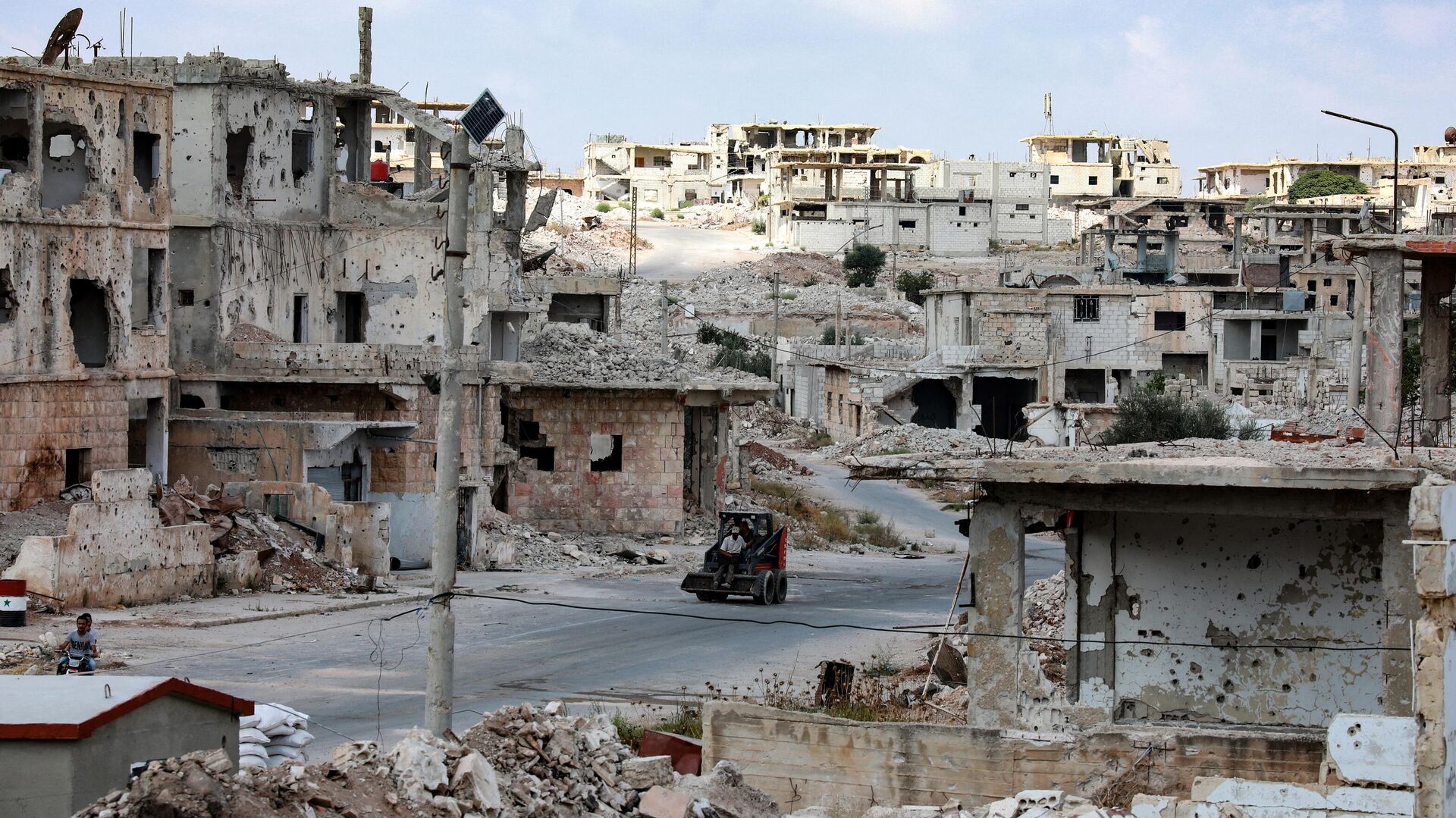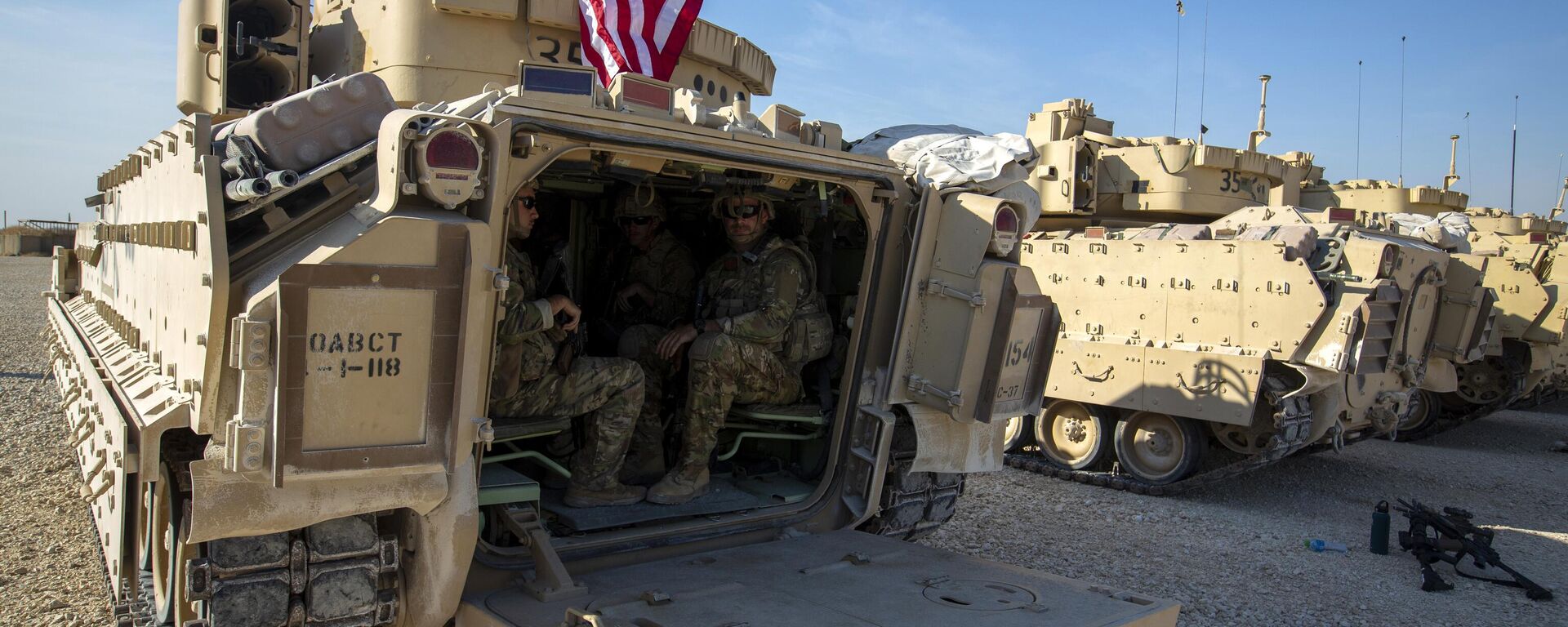https://sputniknews.in/20241203/wests-new-proxy-war-in-syria-may-drive-terror-recruitment-in-south-asia-8487105.html
West's New Proxy War in Syria May Drive Terror Recruitment in South Asia
West's New Proxy War in Syria May Drive Terror Recruitment in South Asia
Sputnik India
Ideological links between Al-Qaeda* and Syrian terror groups ISIS* and Hayat Tahrir al-Sham (HTS*) pose a threat not only to the Middle East but also South... 03.12.2024, Sputnik India
2024-12-03T20:57+0530
2024-12-03T20:57+0530
2024-12-03T20:57+0530
world news
syria
middle east
south asia
al-qaeda
india
pakistan
https://cdn1.img.sputniknews.in/img/07e8/02/03/6430373_0:143:3133:1905_1920x0_80_0_0_223e77954b8980fdd8fbd66e2d2cb3a9.jpg
The threat of radical ideologies spreading beyond Syria to regions like South Asia highlights the geopolitical consequences of the new offensive by Hayat Tahrir al-Sham (HTS), an expert told Sputnik India.Al-Qaeda-allied sectarian terrorists HTS launched a surprise offensive from their stronghold in Syria's north-western Idlib province over the weekend, seizing the major city of Aleppo and advancing southward into Hama before being halted by the Syrian Arab Army north of the provincial capital.HTS is mainly confined to Syria and do not currently pose a threat to its Western supporters, said Dr Shubhda Chaudhary, founder of the Middle East Insights Platform, stressing the need for a strategic responses to prevent further escalation.But the preponderance of foreign jihadis in the group raises concerns about sectarian violence against ethnic and religious minorities like Druze, Armenians, Christians and Alawites.Syria's internal challenges are further compounded by the rise of drug cartels, human trafficking, and black-market activities, all fuelled by terrorist groups, Chaudhary warned.Given the presence of extremist factions in Afghanistan, including militants from Pakistan’s tribal regions, the resurgence of poses significant regional and global security risks, Arshad Mehmood, an expert on regional affairs, associated with several media agencies, told Sputnik."HTS’s ideological affinity and operational capabilities suggest it could follow in al-Qaeda’s footsteps, becoming a destabilising force not just in the Middle East but also in South Asia and beyond," Mehmood said.One-fifth of the world's Muslims, the South Asian group have been drawn into the religious and sectarian crises of the Middle East at various times, Burzine Waghmar, a think tank associated with the Center for Iranian Studies at the South Asia Institute of the University of London, elaborated in conversation with Sputnik India.He noted that ISIS has drawn many recruits from the sparsely populated Maldives, the only state in the subcontinent with a 100 percent Muslim population.Waghmar noted the extremely rapid seizure of Aleppo armed Salafi jihadist group HTS.Al-Qaeda, under Osama Bin Laden and his peers, did not demonstrate any overt animosity towards Shia Muslims, unlike ISIS, ISIS-Khorasan*, or other diverse Sunni groups operating in Pakistan and elsewhere, who regard them as outright heretics.The pundit was sceptical about the prospect of South Asian Muslims heading to join HTS. But he questioned whether some Sunni Muslims might feel compelled to join the group.HTS is adequately armed and staffed, Waghmar said, and any recruiting drives tacitly overlooked by Pakistan could sour its relations with Syria.The HTS resurgence benefits Turkey, Israel and the United States, aligning with their strategic interests, Chaudhary said. The timing of the HTS offensive, coinciding with the fragile Israel-Lebanon ceasefire, has further destabilised the region, he added."No one will emerge as a winner, but if al-Qaeda affiliates prevail, we may face a larger regional problem," he warned.Pakistan is currently in a state of crisis, with various terrorist groups that may be sympathetic to and aligned with HTS, Trigunayat said. He argued that Indian Muslims had not been seduced by terrorist groups and their ideologies.Mehmood said that Turkey seeks to strengthen its influence in northern Syria, advancing its strategic interests against Kurdish groups and maintaining a buffer zone along its border.* Terrorist organisations banned in Russia and other countries
https://sputniknews.in/20241129/is-current-escalation-in-syria-part-of-us-plan-to-destabilise-irans-neighbourhood-8472112.html
syria
middle east
south asia
india
pakistan
Sputnik India
feedback.hindi@sputniknews.com
+74956456601
MIA „Rossiya Segodnya“
2024
Muhammad Sharif
https://cdn1.img.sputniknews.in/img/07e7/0b/05/5257054_0:0:443:444_100x100_80_0_0_b8bd2af32be62a6eecdb4a84c7fd978f.jpg
Muhammad Sharif
https://cdn1.img.sputniknews.in/img/07e7/0b/05/5257054_0:0:443:444_100x100_80_0_0_b8bd2af32be62a6eecdb4a84c7fd978f.jpg
News
en_IN
Sputnik India
feedback.hindi@sputniknews.com
+74956456601
MIA „Rossiya Segodnya“
Sputnik India
feedback.hindi@sputniknews.com
+74956456601
MIA „Rossiya Segodnya“
Muhammad Sharif
https://cdn1.img.sputniknews.in/img/07e7/0b/05/5257054_0:0:443:444_100x100_80_0_0_b8bd2af32be62a6eecdb4a84c7fd978f.jpg
syria, middle east, south asia, al-qaeda, india, pakistan
syria, middle east, south asia, al-qaeda, india, pakistan
West's New Proxy War in Syria May Drive Terror Recruitment in South Asia
Ideological links between Al-Qaeda* and Syrian terror groups ISIS* and Hayat Tahrir al-Sham (HTS*) pose a threat not only to the Middle East but also South Asia, experts warn.
The threat of radical ideologies spreading beyond Syria to regions like South Asia highlights the
geopolitical consequences of the new offensive by Hayat Tahrir al-Sham (HTS), an expert told
Sputnik India.Al-Qaeda-allied sectarian terrorists HTS launched a surprise offensive from their stronghold in Syria's north-western Idlib province over the weekend, seizing the major city of Aleppo and advancing southward into Hama before being halted by the Syrian Arab Army north of the provincial capital.
HTS is mainly confined to Syria and do not currently pose a threat to its Western supporters, said Dr Shubhda Chaudhary, founder of the Middle East Insights Platform, stressing the need for a strategic responses to prevent further escalation.
But the preponderance of foreign jihadis in the group raises concerns about sectarian violence against ethnic and religious minorities like Druze, Armenians, Christians and Alawites.
Syria's internal challenges are further compounded by the rise of drug cartels, human trafficking, and black-market activities, all fuelled by terrorist groups, Chaudhary warned.
"While HTS’s control of Aleppo and the release of political prisoners might appear progressive, the group's actions pose significant threats to minority communities and regional stability," he stressed.
Given the presence of extremist factions in Afghanistan, including militants from Pakistan’s tribal regions, the resurgence of poses significant regional and global security risks, Arshad Mehmood, an expert on regional affairs, associated with several media agencies, told Sputnik.
"HTS’s ideological affinity and operational capabilities suggest it could follow in al-Qaeda’s footsteps, becoming a
destabilising force not just in the Middle East but also in South Asia and beyond," Mehmood said.
One-fifth of the world's Muslims, the South Asian group have been drawn into the religious and sectarian crises of the Middle East at various times, Burzine Waghmar, a think tank associated with the Center for Iranian Studies at the South Asia Institute of the University of London, elaborated in conversation with Sputnik India.
"Modern Pakistan, India and Bangladesh, as successor states of the Indian Empire, now contain the second, third and fourth largest Muslim populations in the world," Waghmar said. "It is unsurprising that many Sunnis have gravitated towards joining ISIS and other militant groups."
He noted that ISIS has drawn many recruits from the sparsely populated Maldives, the only state in the subcontinent with a 100 percent Muslim population.
Waghmar noted the extremely rapid seizure of Aleppo armed Salafi jihadist group HTS.
Al-Qaeda, under Osama Bin Laden and his peers, did not demonstrate any overt animosity towards Shia Muslims, unlike
ISIS, ISIS-Khorasan*, or other diverse Sunni groups operating in Pakistan and elsewhere, who regard them as outright heretics.
The pundit was sceptical about the prospect of South Asian Muslims heading to join HTS. But he questioned whether some Sunni Muslims might feel compelled to join the group.
HTS is adequately armed and staffed, Waghmar said, and any recruiting drives tacitly overlooked by Pakistan could sour its relations with Syria.
The HTS resurgence benefits Turkey, Israel and
the United States, aligning with their strategic interests, Chaudhary said. The timing of the HTS offensive, coinciding with the fragile Israel-Lebanon ceasefire, has further destabilised the region, he added.
"There is always the potential for extremist elements to align themselves with al-Qaeda and other groups," Anil Trigunayat, former ambassador to Jordan, Libya and Malta told Sputnik India. "The ongoing conflict in Syria is opportunistic and results from unfulfilled aspirations, as well as geopolitical factors, foreign interference and interests."
"No one will emerge as a winner, but if al-Qaeda affiliates prevail, we may face a larger regional problem," he warned.
Pakistan is currently in a state of crisis, with various terrorist groups that may be sympathetic to and aligned with HTS, Trigunayat said. He argued that Indian Muslims had not been seduced by terrorist groups and their ideologies.
Mehmood said that Turkey seeks to strengthen its influence in northern Syria, advancing its strategic interests against Kurdish groups and maintaining a buffer zone along its border.
The renewed conflict also fuels the demand for arms and resources, enriching arms producers and smugglers, he concluded.
* Terrorist organisations banned in Russia and other countries



